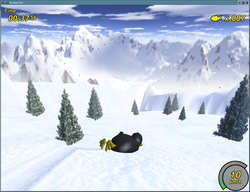Tux Racer: Difference between revisions
→PlanetPenguin Racer: added death of ppracer, removed dead link. |
→PlanetPenguin Racer: added dates and cited source |
||
| Line 52: | Line 52: | ||
PlanetPenguin Racer is available not only for Linux but also for Windows. PlanetPenguin Racer is easily installable on many Linux distributions. Users of [[Debian]] and [[Ubuntu Linux|Ubuntu]] can install the package '''planetpenguin-racer''' using [[Synaptic]] or [[apt-get]]. For [[Gentoo Linux|Gentoo]], it is available from [[Portage (software)|Portage]] as '''ppracer'''. [[Fedora Core]] users can install the package '''ppracer''' via [[Yellow dog Updater, Modified|Yum]]. |
PlanetPenguin Racer is available not only for Linux but also for Windows. PlanetPenguin Racer is easily installable on many Linux distributions. Users of [[Debian]] and [[Ubuntu Linux|Ubuntu]] can install the package '''planetpenguin-racer''' using [[Synaptic]] or [[apt-get]]. For [[Gentoo Linux|Gentoo]], it is available from [[Portage (software)|Portage]] as '''ppracer'''. [[Fedora Core]] users can install the package '''ppracer''' via [[Yellow dog Updater, Modified|Yum]]. |
||
The PlanetPenguin Racer Project is dead. The latest stable release is 0.3.1 |
The PlanetPenguin Racer Project is dead. The latest stable release is 0.3.1, released March 1, 2005, and the latest alpha release is 0.5alpha, released September 26, 2005 [http://web.archive.org/web/20060101094408/projects.planetpenguin.de/racer/]. The original website died in mid-2006, and downloads can no longer be found there. PlanetPenguin Racer is still available on the internet in games archives. |
||
=== Roxor Games: TuxRacer === |
=== Roxor Games: TuxRacer === |
||
Revision as of 02:13, 7 January 2007
| Tux Racer | |
|---|---|
 Screenshot | |
| Developer(s) | Jasmin Patry |
| Publisher(s) | Sunspire Studios |
| Designer(s) | Jasmin Patry |
| Engine | OpenGL |
| Platform(s) | Cross-platform |
Tux Racer is a 3D computer game starring the Linux mascot, Tux the penguin.
In the game, the player controls Tux (or one of three other characters) as he slides down a course of snow and ice collecting herring. Sliding on ice makes Tux go faster, while sliding on snow allows for more maneuverability and sliding on rocky patches will slow Tux down. There are also trees to block Tux's path and flags for sake of marking out the course.
Game play
The left/right steering controls are typical of a racing simulation game, except that the up arrow key causes Tux to "paddle" with his flippers. Correct use of the paddle command is essential to getting good race times. Paddling slows Tux down when at a high speed but speeds him up at slow speeds. Paddling when in mid-air may also be used to increase the length of a jump. Jumps can be caused by the shape of the landscape or by holding down the "energy" key (usually e) and releasing it. Releasing the key when a jump is imminent will naturally make a larger jump.
Points are also scored by collecting herring that are scattered along the various courses. In order to progress to the next level of the game you have to both collect sufficient herring and reach the end of the course within a preset time limit.
Like many open-source games, the replay value of Tux Racer is extended by easy modification of the game. New maps can be created by making three raster images to indicate height, surface, and object placement. Other modifications will allow Penguins to fly or achieve speeds of mach one.
History
Early development
TuxRacer was originally written by Jasmin Patry as a college project in 1999. He released it as free software under the GPL in 2000. The software was developed as a community project for almost a year.
Sunspire Studios: TuxRacer
In August 2001 Patry announced that he and two friends had formed a company called 'Sunspire Studios' to sell an enhanced version of the software under a closed-source commercial license.
Shortly after, Sunspire Studios retailed TuxRacer for US$14.99 with versions for GNU/Linux, Mac OS X and Windows operating systems.
Sunspire never produced another product and ceased doing business sometime in 2003. Their Internet domains [1] [2] no longer function. According to archive.org, there had been no significant changes to their site since September 22, 2002, when the Tux Racer 1.1.1 Linux Patch was released [3]. It appears that the site continued to exist almost unchanged until 2004. Their demo of version 1.1 can still be downloaded here.
OpenRacer
When Sunspire took the game commercial, Nathan Matias took the last GPL'ed version of the program and released it under the title 'OpenRacer' as an open sourced project hosted on the Sourceforge servers. This version was updated sporadically - but was eventually abandoned (although you can still download and play this version).
PlanetPenguin Racer
Since the original studio ceased selling the game, a fork called PlanetPenguin Racer was created from the last GPL-licensed version of Tux Racer. In addition to the levels from the original game, PlanetPenguin Racer also includes additional levels which have been created by the community.
PlanetPenguin Racer is available not only for Linux but also for Windows. PlanetPenguin Racer is easily installable on many Linux distributions. Users of Debian and Ubuntu can install the package planetpenguin-racer using Synaptic or apt-get. For Gentoo, it is available from Portage as ppracer. Fedora Core users can install the package ppracer via Yum.
The PlanetPenguin Racer Project is dead. The latest stable release is 0.3.1, released March 1, 2005, and the latest alpha release is 0.5alpha, released September 26, 2005 [4]. The original website died in mid-2006, and downloads can no longer be found there. PlanetPenguin Racer is still available on the internet in games archives.
Roxor Games: TuxRacer
Roxor Games has released an arcade version as a redemption game; it only has left and right controls and misses the subtlety of play that the 'paddle' function produced.
